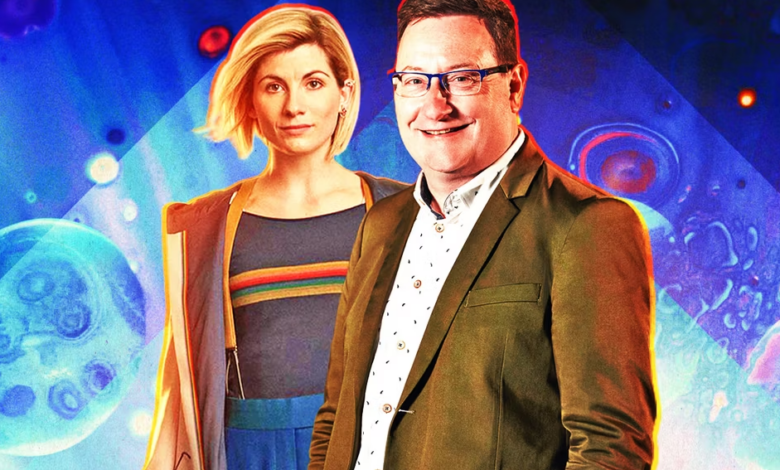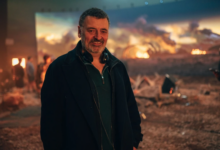How Chris Chibnall and Jodie Whittaker Saved Doctor Who

Despite facing more than their share of backlash about their run on the series, producer Chris Chibnall and actor Jodie Whittaker saved Doctor Who.
One reason Doctor Who’s 60th anniversary is worth celebrating is due to how difficult it is for any character to endure for so long. Making a single episode of television is difficult and costly, let alone an entire season and some specials. Even with the extended break Doctor Who took from regular production, its endurance is the result of the hard work and creativity of near-countless artists and professionals. However, most recently, showrunner and executive Chris Chibnall and Thirteenth Doctor Jodie Whittaker saved Doctor Who from a second cancelation. Beyond the first regeneration of the Doctor as a woman, the Chris Chibnall era faced controversy.
When Russell T Davies was announced as Chibnall’s successor, many took it as a move of desperation on the part of the BBC. In reality, it was because Disney agreed to amplify the budget. Chibnall brought a lot of changes to the series, both visually and in the narrative. Beyond the big sci-fi concepts, the stories were less subtle with the moral lessons found in the show from the beginning. While it’s unclear what the budget for Chibnall’s seasons were, the episodes looked like money. Still, when Davies returned to the series he helped relaunch in 2005, critical fans thought this meant a complete reboot or some other storyline that would retcon Chinball’s and Whittaker’s Doctor out of existence. Thankfully, that hasn’t happened. Chibnall’s final season amounted to six episodes and three specials over two years. While the reduced episode count was also criticized, Doctor Who fans and critics almost got nothing at all.
Why the Chris Chibnall Era of Doctor Who Is So Controversial

The main reason Chris Chibnall’s era of Doctor Who was so controversial was that he cast Jodie Whittaker, a woman, as the Doctor. It seems silly in a decades-old sci-fi universe known for progressive stories, but bad-faith critics even say Star Trek “has gone woke” nowadays. While not always great at it, the modern era of Doctor Who has also continued to highlight diversity in its guest cast and, specifically, the Doctor’s companions.
Jodie Whittaker said vitriol from the trolls draws “a fine line between the hilarity of it and the fact that it’s terrifying that a woman being given a particular job can cause so much rage.” Similarly, Chibnall and company’s stories utilized real-life historical figures, like Rosa Parks. Of course, telling sci-fi stories that teach children about history is the reason Doctor Who exists at all. Though, not all the critique was bad faith. The Chibnall era made some major changes to the universe, and in his last season, destroyed half of it.
Beyond the Flux and the Timeless Child, the Chibnall era marked a departure of the look of the series, too. Similarly, longtime composer Murray Gold left and British-Nigeran composer Segun Akinola took over. So, the episodes also had a different “feel” than the past 13 years of the show. There were many significant changes to what Doctor Who was beyond simply diversity and more overt social messaging. In other words, precisely what is necessary if a storytelling universe is going to continue long enough to make its centenary special.
Without the Chris Chibnall Era, Fans Don’t Get the Fourteenth or Fifteenth Doctors

The return of David Tennant as the Fourteenth Doctor is, in part, a return-to-form for Doctor Who. This isn’t to say the Chibnall or Moffat eras were that drastic a departure, either. Simply, it’s a former Doctor and former companion reuniting with a former showrunner in celebration of the history of the show. Ncuti Gatwa’s “Season 1” (which feels like a Disney directive), not only takes the show in a fresh direction, not one of the four Russell T Davies specials neglects to refer to the Thirteenth Doctor in some way.
If Davies was correcting any Doctor Who mistakes, they were his own. Specifically, the return of Donna Noble allowed her to get her agency back along with her memories of the Doctor. It had nothing to do with retconning the Flux, the Timeless Child or any other elements introduced in the Chibnall era. Just as Moffat embraced the foundation Davies laid, the once and future showrunner is giving his predecessor the same respect. While Davies faces his own trollish criticism, he will likely reap the credit for “fixing” Doctor Who when he had the benefit of Disney’s deep pockets.
One can make many comparisons to Doctor Who and Star Trek. The Thirteenth Doctor’s era is a bit like Voyager, the first of those shows led by a woman. Controversial at the time, today it’s considered one of the great entries in that universe. Chris Chibnall’s era will likely enjoy the same increased appreciation. Yet, anyone who wants to see the Doctor, the TARDIS and all the companions continue to tell new stories in new ways owes a debt of gratitude to Chibnall and Whittaker.






